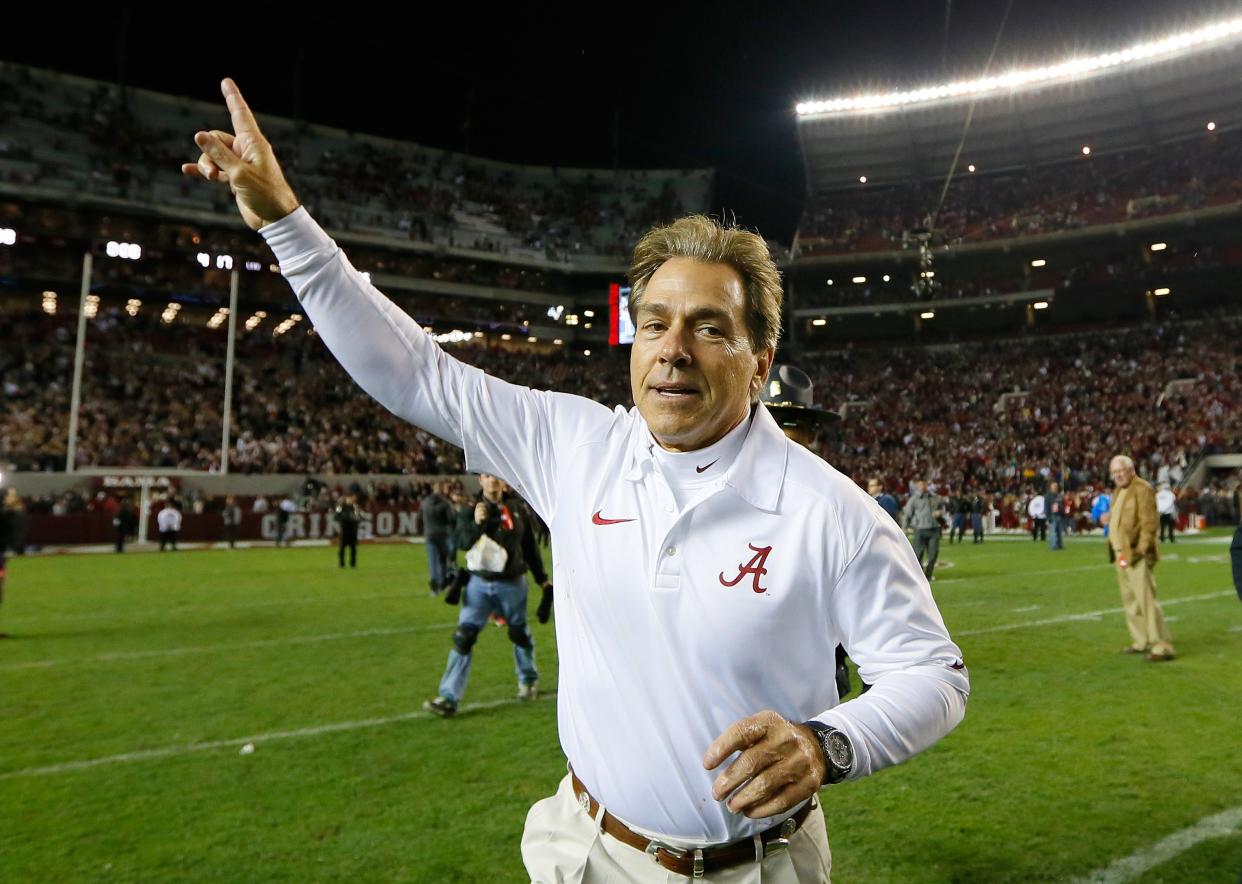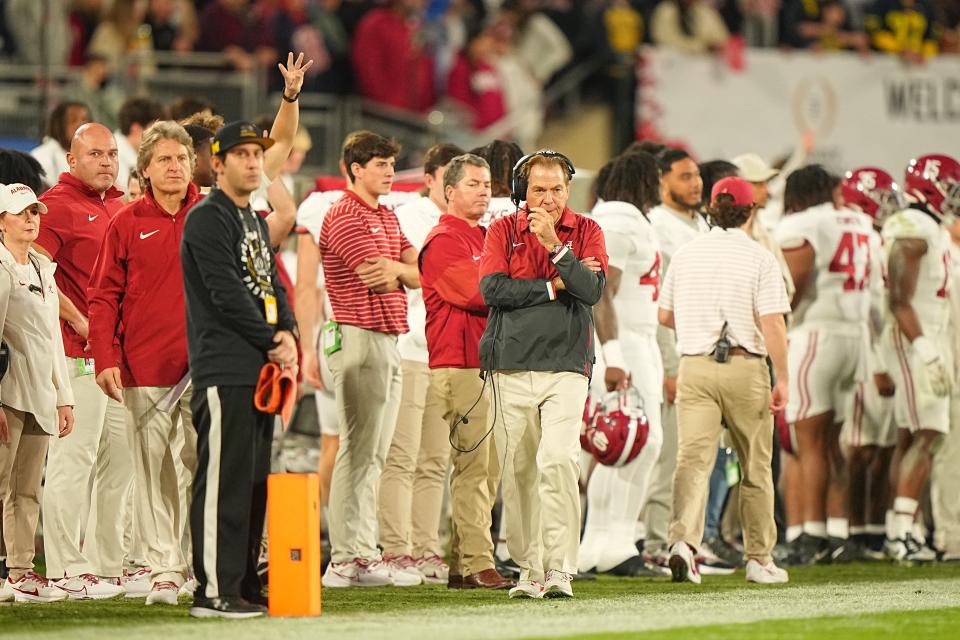Nick Saban Was College Football's Center of Gravity

- Oops!Something went wrong.Please try again later.
- Oops!Something went wrong.Please try again later.
- Oops!Something went wrong.Please try again later.
Kevin C. Cox/Getty Images
Nick Saban, who retired on Wednesday at 72, had arguably the most successful run a coach has ever staged at one school. The only reason it’s arguable is that his long-ago predecessor at the University of Alabama, Bear Bryant, won an identical six titles in Tuscaloosa. But in matching an inherently unmatchable standard, Saban ought to have eliminated the need to hedge. Throw in another title from his earlier seasons at rival LSU, and his case to be the greatest is strong, even over the man he is most commonly measured against. In America’s long, weird college football tradition, Nick Saban was the best to ever do it.
Was. The new tense won’t feel normal for a while. But it will take much longer to unwind Saban’s effect on the rest of the sport, which reshuffled time and again as athletic directors, boosters, and coaches at other schools scrambled to keep up with him. The biggest immediate adjustment now that Saban has driven his Ferrari into the sunset will be at Alabama. The Tide have to find a coach who won’t shrink under a limelight that Saban ensured will be blindingly bright. But everyone else is due for a significant adjustment, too. After 17 years of Saban at Alabama, his old competitors finally have to stare at a different North Star. Saban was the constant that other programs oriented themselves around, and his departure leaves them just as directionless for the moment as it leaves Alabama.
His coaching tree has a lot of branches now. Former Saban assistants have been all over college and NFL coaching staffs for years. In a great many of those cases, a coach’s association with Saban has been the primary selling point that landed him a plum job or helped him climb a career ladder. It was established long ago how difficult it is for a replica to achieve the same outcomes as the real thing, but coaches with ties to him wear the patina of Sabanism proudly. When Alabama offensive coordinator Michael Locksley took the Maryland head coaching job in 2018, a reporter asked what he had learned since a disastrous stint at New Mexico a decade earlier. “I just spent three years saturated in winning,” Locksley said. Prior head coaching experience was no longer the main thing. Working under Saban’s wing was.

University of Alabama vs University of Michigan, 2024 CFP National Semifinal
Schools that have tried to get a dollop of Saban have sometimes done well. Florida State hired Jimbo Fisher, a Saban assistant at LSU, and won a national title in 2013. On the other hand, Texas A&M also hired Fisher, and all the Aggies got was a $78 million buyout. Most of the direct hires from Saban’s staff have not met the loftiest expectations, and some have been outright disasters. Maybe the worst was Tennessee’s pickup of Saban defensive coordinator Jeremy Pruitt, who posted a sub.-500 record in three years and was fired amid a burgeoning NCAA investigation. But Pruitt had eight years of assisting Saban under his belt. It was not hard for the Volunteers to think he could be their man.
Just one understudy became as good as the master: Kirby Smart, the defensive coordinator who went to Georgia in 2016 and, in 2021, beat Saban head-to-head to deliver a national title to Athens. (Smart won another the next year.) Smart wasn’t the first Saban assistant to know Xs and Os and recruiting, but he was the first who could emulate Saban’s competitive ideal: an intense focus on process over outcome, an ability to control and deliver a message, and an openness to new ways of thinking and an evolving staff. Keep it up another 12 or 13 years, and Smart could be Saban’s equal. Maybe.
One school in particular has not hired Saban assistants but has built its coaching strategy around Saban all the same: Auburn, the Tide’s blood rival in the Iron Bowl. Beating Saban became everything for the Tigers, who have sometimes happened to win national championships while otherwise focused on slaying Alabama. A win over Saban in 2017 removed then-coach Gus Malzahn from the hot seat and got him tens of millions of dollars in guarantees instead. (Auburn eventually did have to pay the resultant huge buyout.) When the school was in the market for a head coach again, before the 2023 season, it picked Liberty coach Hugh Freeze. Why? Not because his 34 wins in four years against a cupcake schedule were so compelling, but because Freeze—all the way back in 2014 and 2015—had beaten Saban. Twice in a row. That Ole Miss had fired him against a backdrop of an NCAA investigation and call logs to an escort service on his university phone did not matter as much as Freeze’s PhD in antagonizing Saban.
Schools rearranged their plans to respond to the Alabama boss. Coaches rearranged their philosophies, at least in part, because Saban rearranged his own. Saban’s first few dominant Alabama teams had a ground-and-pound offensive identity, featuring relatively anonymous game-manager quarterbacks. But in the mid-2010s, Saban saw the game moving toward spread offense and run/pass option plays. So he hired Lane Kiffin, the former USC, Tennessee, and Raiders head coach. Kiffin was a big personality, but he knew the spread, and Alabama’s offense was supercharged overnight.
That shift led to three more national titles—and, perhaps more influentially, it was an encouraging data point for other head coaches considering wholesale changes. LSU’s Ed Orgeron hired a young passing game guru named Joe Brady, for example, in 2020. After years of LSU preferring to play manball, LSU paired Brady with Joe Burrow and some star receivers to produce the sport’s most terrifying offense…ever. Ohio State hired Ryan Day to modernize its own pass game. Those moves weren’t exactly responses to Saban’s, but his evolution at Alabama demanded that other serious coaches follow him. After all: If the greatest coach of his generation could step outside his comfort zone and get those results, didn’t others have to try it?
That openness to change was a key facet of the roadmap Saban laid out—along, of course, with his focus, his ability to work a recruit’s living room, and his ability to get everyone at Alabama to march to his drumbeat.
Now, with Saban gone, Alabama have the chance to do what so many schools did over the last 17 years, and hire their own not-quite-identical Saban clone. But the Tide, if they’re smart, will not try to hire a perfect mold of Saban. Most aren’t so perfect, it has turned out, and the next man at Alabama will need to set his own course. When he does, the sport’s other top programs will face their own big question. With the greatest of all time gone, who can they copy?
Originally Appeared on GQ

